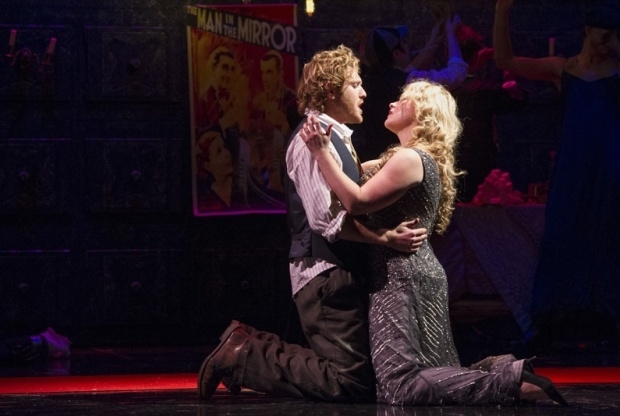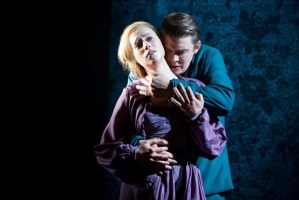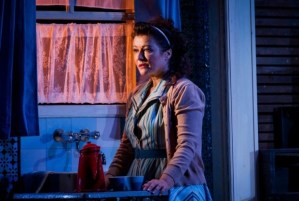The Tales of Hoffmann (English Touring Opera – tour)
Offenbach’s episodic grand opera is a major undertaking for ETO

© Richard Hubert Smith
The tour itself is a twice-yearly epic, and after London the current French season travels to Exeter, Durham and points north, south, east and west. A shame it doesn’t always show the company at its best. Pelléas et Mélisande is a success and certainly well worth catching, but Werther…? Now, to complete the triptych, here’s Offenbach’s fantasy opera The Tales of Hoffmann, well sung but at sea in a second-rate staging.
Offenbach’s last opera is a fantasmagoric creation, yet paradoxically it shows the operetta king at his most serious and sublime. Melody after melody wrings the heart, even though the tale of a dipsomaniac writer who depicts his unattainable true love, Stella, in fictional incarnations is both melodramatic and surreal.
Some of the problems here are due less to the concept than its execution. Maybe that can be worked on before it hits the road. The Olympia sequence, though, is beyond salvage. This is the episode where Hoffmann is bewitched by a puppet; but the audience is asked to accept a small, faceless light-doll as the object of his desires, albeit one that’s bewilderingly interlaced with flash appearances by soprano Ilona Domnich in person.
The melody-soaked tale of Antonia, a supernatural La traviata, fares better. Its ravishing music finds Domnich and the exciting young tenor Sam Furness in trascendent form, while the powerful and charismatic (but too often here poorly directed) Australian baritone Warwick Fyfe aptly plays Doctor Miracle as Nosferatu the vampire. The third section, that of the Venetian courtesan Giulietta, pales by comparison despite the famous Barcarolle.
'Lyrical, fearless and tireless'
Louise Mott completes a superb quartet of lead singers and is a constant delight as Nicklausse, the not-so veritas Muse that Hoffmann finds in the vino. (Bafflingly, given her role’s prominence, Mott was excluded from the principals’ bow at the curtain call. An uncomfortable moment.) The ETO Orchestra under Philip Sunderland does its best with the threadbare forces that serve Pelléas so well, but Offenbach’s orchestrations are way too grand for just 11 players so it sounds scrawny.
The Tales of Hoffmann, more than most operas, cries out for a directorial vision. It lends itself to endless reinterpretation but without a sense of stylistic panache it’s lost. James Bonas has some decent ideas, and he’s abetted by a flexible design by Oliver Townsend that has all the bells and whistles he could wish for, but too much of his staging is slapdash. Fyfe’s Lindorf, in the Prologue, doesn’t know how to use walking sticks; sprightly young Matt R J Ward as Franz, Antonia’s family servant, has not been taught how to play an old man; Hoffmann’s reflection continues to adorn the mirror after it's been stolen; Stella’s long-awaited appearance is invisible to half the audience. Add an inordinate number of first-night glitches and there was something of the school play about it.
Yet where it’s good it’s very good indeed. Furness is lyrical, fearless and tireless in the title role and Domnich gets to sing "Elle a fui, la tourtourelle" in the original French, surely making many in the audience yearn to hear the whole opera sung in the composer's own language. A shout out too for the underused Tim Dawkins as Crespel, Antonia’s father. A splendid cameo.
The Tales of Hoffmann plays again at the Britten Theatre (in the Royal College of Music) on Saturday 10 October, then tours to Buxton, Malvern, Durham, Harrogate, Cambridge, Bath, Snape and Exeter until 21 November.














